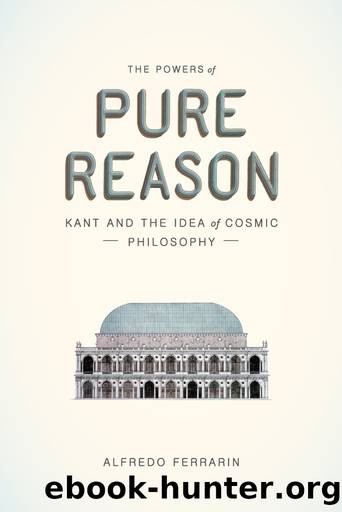The Powers of Pure Reason by Alfredo Ferrarin;

Author:Alfredo Ferrarin; [Ferrarin, Alfredo]
Language: eng
Format: epub
ISBN: 9780226243290
Publisher: University of Chicago Press
Published: 2015-03-12T05:00:00+00:00
6. The A Priori
The mathematician obviously need not look to appearances to construct intuitive objects. There is nothing like mathematical abstraction from experience. When, contrasting mathematical and philosophical knowledge, Kant writes that the mathematician constructs both the empirical image of a triangle and its pure intuition, he stresses that he/she does so âin both cases completely a priori, without having had to borrow the pattern [das Muster] for it from any experienceâ (KrV A 713/B 741). It is natural to infer that the mathematician constructs a priori the triangle, whereas in my experience of triangles, i.e., when the geometric form is applied to an object (the side of the pyramid), I neither see anything a priori nor construct a triangle. I am as passive with regard to the perception of the given appearance as mathematics is wholly active in its activities and constructions. The philosopher does not enjoy the mathematicianâs privilege and can hope to explain only the concepts involved in experience.
This apparently natural conclusion is mistaken.
1. Were it so, mathematics would give rise to a world of forms, if not separate from then surely independent of the world of experience. Reconciling the two worlds would be a subsequent but distinct problem, one that would consist in accounting for not simply the (âtop-down,â as it were) possibility of applying mathematics to appearances but also the inverse problem, the âbottom-upâ possibility of the mathematical apprehension of objects. For in everyday and scientific experience it so happens that I apprehend appearances according to geometric forms (as in âthis table is rectangularâ). How that can happen if mathematics is an a priori construction while experience is experience of given objects is bound to remain unintelligible. As with Aristotleâs criticism of Platoâs mathematical forms, forms (mathematical or otherwise) are not independent of matter. Forms are always forms-of-matter, principles of spatiotemporal or conceptual organization of appearances. To be sure, for Kant mathematical objects are not Aristotleâs hulÄ noÄtÄ (intelligible matter), nor does the mathematician abstract forms from matter. But certainly mathematical objects do not exist in the mind (or in a Platonic plane of truth). Construction speaks against this givenness of mathematical objects. If we drove this wedge between a priori mathematical knowledge and a posteriori empirical knowledge, the purity of rational mathematical cognitions would be distinct from but in truth irreconcilable with our access to empirical reality. Between a priori and a posteriori there would be an alternative rather than a duality, for they would denote two mutually exclusive worlds.
2. Were it so, mathematical knowledge would be opposed to empirical knowledge and to transcendental philosophy alike. We would get the amazing result that the first Critique would not even come close toâindeed has probably even forgotten along the wayâa major part of the problem it set out to solve. That is, it could not reply to its leading questionâhow are synthetic a priori judgments possible?âthrough an explanation of the lawfulness of experience. Instead of the fundamental investigation of the principles making possible all forms
Download
This site does not store any files on its server. We only index and link to content provided by other sites. Please contact the content providers to delete copyright contents if any and email us, we'll remove relevant links or contents immediately.
The European History Highway: A Guide to Internet Resources by Dennis A. Trinkle Scott A. Merriman(503)
The Seven Wonders of the Ancient World by Michael Denis Higgins(482)
European Security in a Global Context by Thierry Tardy(477)
European Security without the Soviet Union by Stuart Croft Phil Williams(475)
The Routledge companion to Christian ethics by D. Stephen Long Rebekah L. Miles(464)
Hudud Al-'Alam 'The Regions of the World' - a Persian Geography 372 A.H. (982 AD) by V. V. Minorsky & C. E. Bosworth(405)
Get Real with Storytime by Julie Dietzel-Glair & Marianne Crandall Follis(401)
Hyperculture by Byung-Chul Han(395)
Gorbachev And His Generals by William C. Green(393)
Tibetan Studies in Comparative Perspective by Chih-yu Shih Yu-Wen Chen(389)
Governance, Growth and Global Leadership by Espen Moe(387)
CliffsNotes on Fitzgerald's The Great Gatsby by Kate Maurer(366)
The Oxford History of the World by Fernández-Armesto Felipe;(361)
How Languages Are Learned 5th Edition by Patsy M Lightbown;Nina Spada; & Nina Spada(358)
The Egyptian Economy, 1952-2000 by Khalid Ikram(357)
Oral Poetry and Narratives from Central Arabia: The Poetry of Ad-Dindan : A Bedouin Bard in Southern Najd (Studies in Arabic Literature, Vol 17) (English and Arabic Edition) by P. M. Kupershoek P. Marcel Kurpershoek(346)
The Oxford Handbook of the Incas by Sonia Alconini(337)
Europe Contested by Harold James(324)
The Hutchinson Dictionary of Ancient and Medieval Warfare by Peter Connolly John Gillingham John Lazenby(313)
